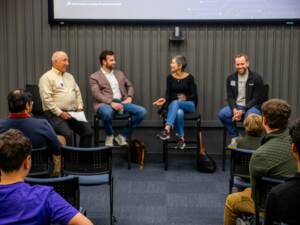Entrepreneurs face a unique set of challenges. During Minnebar 18, a panel of startup CEOs discussed the importance of mentors in helping them navigate the complexities of running a business.
On April 20, MESA mentor Mark Capaldini led a panel discussion with MESA mentees to share their experiences as an entrepreneur.
 Panelists:
Panelists:
Andrew deLeeuw of Docsci Health
Mary Kay Ziniewicz of Bus Stop Mamas
Nick Wassenburg of Cludo
Panelist shared their insights on the issues facing founders and CEOs as they look to grow, and best practices on how to get the most from a mentorship experience. Highlights here are edited and condensed.
Why Consider Having a Mentor?
- Andrew: Hearing thoughts from people outside my own experience is invaluable. My mentor’s experience helps me see things I wouldn’t otherwise.
- Mary Kay: Having mentors allows me to be emotional, express fears and self-doubt in a confidential space.
- Nick: Having mentors as a first-time CEO is crucial. They help prioritize challenges and offer solutions based on their experience.
How Does a Mentor Differ from Other Advisors or Investors?
- Mary Kay: My mentor is confidential. I can discuss issues with investors and board members, but it’s different with a mentor.
- Nick: Mentors aren’t involved in my company’s finances or board. They’re a safe space to try out ideas before presenting them to others.
- Mark Capaldini (Panel Moderator): MESA specifically prohibits mentors from being investors or board members to avoid any bias.
What Should You Look for in a Mentor or Mentoring Program?
- Andrew: I look for someone who’s been there, done that, and ideally someone who has failed—you learn a lot from failures.
- Mary Kay: My mentors are chosen based on what my business needs at any given time. I also have an advisory board for specific expertise.
- Nick: The MESA process was beneficial. It wasn’t a pitch session; it was about the challenges I was facing. Mentors are simply interested in helping.
What is an Example of Your Mentors’ Impact on Your Decision Making?
- Andrew: I’ve run everything by my mentors, including major pivots and strategic partnerships. Their input has drastically changed my thought process.
- Mary Kay: My mentor’s financial advice has been crucial. He helps me see things from a business perspective and ensures plans are realistic.
- Nick: Early on, my mentors cautioned me not to build an unrealistically ambitious plan. It helped me avoid setting myself up for failure.
From Your Perspective, What Does a Good Mentor Do (and Not Do)?
- Andrew: Good mentors don’t make decisions for me. They provide honest input and refocus me on my goals.
- Mary Kay: My mentors don’t always agree with me, which is helpful. They challenge me and bring a different perspective.
- Mark Capaldini (Panel Moderator): It sounds like mentors ask questions rather than giving answers.
- Panel (in agreement): Absolutely. They share their experiences without necessarily having all the answers.
How Has Your Mentor Changed How You Think About Your Business?
- Andrew: My mentors keep me focused on the big goals and help with prioritization and timing.
- Mary Kay: My mentor keeps me grounded in financial realities and helps me focus on growth.
- Nick: My mentors provide alternate views, helping me make better decisions, especially regarding hiring.
How Often Do You Interact with Your Mentors?
- Panel: Typically, there’s a monthly in-person meeting, but additional communication happens as needed via calls or email.
Additional Tips for Aspiring CEOs
- Mark Capaldini: Develop your network and find mentors early on.
- Panel: Be open to learning from others, be willing to adapt, and have the perseverance to keep going despite challenges.
Conclusion
Finding a mentor can be a game-changer for CEOs. Mentors offer valuable guidance, support, and a safe space to discuss challenges. If you’re a startup looking to grow your business, consider seeking out a mentor who can help you navigate the journey.
For aspiring Minnesota-based software companies, MESA provides pro-bono mentoring from C-level executives who have experience in the startup trenches. For 13 years, MESA has actively engaged with the founders and CEOs of more than 85 companies, helping them focus on the important goals that will help them thrive and grown.

